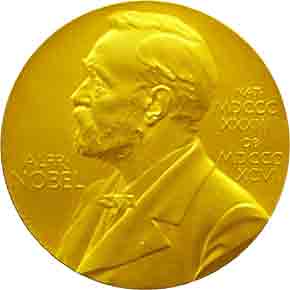On Friday (Oct 10) the Norwegian Nobel Committee awarded the Nobel Prize for Peace to a Pakistani teenager, Malala Yousafzai and an Indian child rights campaigner, Kailash Satyarthi.
At the age of just 17, Malala is the youngest ever recipient of the prize. The teenager was shot in the head by militants in October 2012 when she was on her way home from school. She now lives in Birmingham in the UK.
Thorbjorn
Jagland, chairman of the Norwegian Nobel Committee, said:
"Despite her youth, Malala Yousafzai, has already fought for several years for the right of girls to education and has shown by example that children and young people too can contribute to improving their own situations. This she has done under the most dangerous circumstances. Through her heroic struggle she has become a leading spokesperson for girls' rights to education."
The 60-year-old Kailash Satyarthi, has for decades been a leading voice in the fight against child trafficking and forced labor in India. His organization, Save the Childhood Movement, says it has rescued 83,000 Indian children from servitude in India since 1981.
Mr Satyarthi has maintained the tradition of Mahatma Gandhi and headed various forms of peaceful protests, "focusing on the grave exploitation of children for financial gain," the committee said at the Nobel Institute in Oslo. He founded Bachpan Bachao Andolan, or the Save the Childhood Movement, which campaigns for child rights and an end to human trafficking.
The Times of India said that Kailash Satyarthi's Nobel Prize is a cause for national celebration in India, even if many Indians had to Google him on Friday to appreciate the battle he has fought for child rights. There was a time when many in India were scathing of Satyarthi's work, particularly his 'Rugmark' which was opposed by carpet weaver organizations as a "western" conspiracy to render their work uncompetitive. But today, as Satyarthi becomes the toast of the nation and the world, its unconditional applause for the nation's latest celebrity.
The committee said it was important that a Muslim and a Hindu, a Pakistani and an Indian, had joined in what it called a common struggle for education and against extremism.
After Malala Yousufzai and Kailash Satyarthi jointly won the Nobel Peace Prize, official reaction in Pakistan was overwhelmingly positive. Prime Minister Nawaz Sharif called her the "Pride of Pakistan" and said girls and boys should "take the lead from her struggle and commitment." The spokesman for Pakistan's powerful army, Major General Asim Bajwal, sent a congratulatory tweet, saying "Except for terrorists, all Pakistanis want their children in school."
However, Many Pakistanis are skeptical about the meteorite rise to fame of Malala propelled by the Western media and Western controlled international organizations and institutions.
Liaqat Baloch, a leader of the Jamaat-e-Islami, a major political party, said: "Malala is a Pakistani student and she is getting a lot of support and patronage abroad. On the surface this is not a bad thing and we welcome this, and there is no objection to the award, but the attack on Malala and then her support in the west creates a lot of suspicions. There are lots of girls in Pakistan who have been martyred in terrorist attacks, women who have been widowed, but no one gives them an award. So these out of the box activities are suspicious."
The BBC quoted Tariq Khattack, editor of the Pakistan Observer, condemning the prize and Malala: "She is a normal, useless type of a girl. Nothing in her is special at all. She's selling what the West will buy."
Not surprisingly, Chinese media has expressed skepticism over
the Pakistani teenager being chosen for the award saying it was used to
positively portray US intervention in Pakistan and Afghanistan.
(Note: You can view every article as one long page if you sign up as an Advocate Member, or higher).






